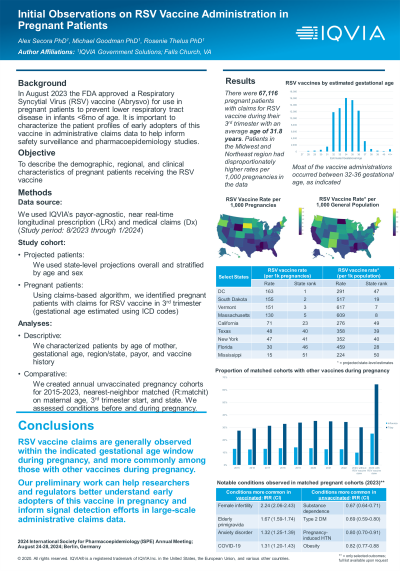Spotlight Session - Vaccines
Session: Spotlight Poster Session B
(BSPOT53) Initial Observations on RSV Vaccine Use in Pregnant Patients
Tuesday, August 27, 2024
8:00 AM - 6:00 PM CEST
Location: Foyer 3


Alex Secora, PhD
Asociate Director of Epidemiology
IQVIA, United States- MG
Michael Goodman, PhD
IQVIA
Falls Church, United States - RT
Rosenie Thelus, PhD
IQVIA
Falls Church, United States
Presenting Author(s)
Co-Author(s)
Background: In August 2023 the FDA approved a Respiratory Syncytial Virus (RSV) vaccine (Abrysvo) for use in pregnant patients to prevent lower respiratory tract disease in infants < 6 months of age. It is important to characterize the patient profiles of early adopters of this vaccine in administrative claims data to help inform safety surveillance and pharmacoepidemiology studies.
Objectives: To describe the clinical characteristics of pregnant patients receiving the RSV vaccine
Methods: We used IQVIA LRxDx Open Claims, a payor-agnostic, near real-time medical and pharmacy administrative claims database, to identify pregnant patients receiving the RSV vaccine from August 2023 to December 2023. We used an algorithm developed for the FDA BEST Initiative to identify pregnant patients, and National Drug Codes and Current Procedural Term codes to identify RSV vaccines, and other vaccines. For preliminary comparative analyses we created unvaccinated pregnancy cohorts for 2022 and 2023 separately, and matched on maternal age, pregnancy start date (+/- 15 days), and U.S. state.
Results: There were 327,756 pregnant patients during the study period, with 9,615 (~3%) receiving the vaccine. The mean age (32.8 years old) of the vaccinated was slightly older than all pregnant patients (29.5); there were no real trends from a geographic perspective. Of those vaccinated, ~35% and ~43% had an influenza vaccine and Tdap vaccine, respectively; this is considerably higher than for pregnant patients in prior years (2016-2022), ranging from 10-16% for influenza and 20-23% for Tdap, with notable drops post COVID-19 for influenza. When comparing the vaccinated cohort to matched cohorts of unvaccinated pregnant patients in both 2022 and 2023, codes suggestive of high-risk pregnancy were observed in relatively equal proportions regardless of vaccination status. Some conditions like gestational diabetes and elderly primigravida were notably more common in the vaccinated cohort.
Conclusions: We are beginning to understand the patient profile associated with early adopters of the RSV vaccine in pregnant patients. Code-based characterizations in large administrate claims data can help inform RSV vaccine surveillance, particularly in the development of reliable and valid outcome background rates.
Objectives: To describe the clinical characteristics of pregnant patients receiving the RSV vaccine
Methods: We used IQVIA LRxDx Open Claims, a payor-agnostic, near real-time medical and pharmacy administrative claims database, to identify pregnant patients receiving the RSV vaccine from August 2023 to December 2023. We used an algorithm developed for the FDA BEST Initiative to identify pregnant patients, and National Drug Codes and Current Procedural Term codes to identify RSV vaccines, and other vaccines. For preliminary comparative analyses we created unvaccinated pregnancy cohorts for 2022 and 2023 separately, and matched on maternal age, pregnancy start date (+/- 15 days), and U.S. state.
Results: There were 327,756 pregnant patients during the study period, with 9,615 (~3%) receiving the vaccine. The mean age (32.8 years old) of the vaccinated was slightly older than all pregnant patients (29.5); there were no real trends from a geographic perspective. Of those vaccinated, ~35% and ~43% had an influenza vaccine and Tdap vaccine, respectively; this is considerably higher than for pregnant patients in prior years (2016-2022), ranging from 10-16% for influenza and 20-23% for Tdap, with notable drops post COVID-19 for influenza. When comparing the vaccinated cohort to matched cohorts of unvaccinated pregnant patients in both 2022 and 2023, codes suggestive of high-risk pregnancy were observed in relatively equal proportions regardless of vaccination status. Some conditions like gestational diabetes and elderly primigravida were notably more common in the vaccinated cohort.
Conclusions: We are beginning to understand the patient profile associated with early adopters of the RSV vaccine in pregnant patients. Code-based characterizations in large administrate claims data can help inform RSV vaccine surveillance, particularly in the development of reliable and valid outcome background rates.
